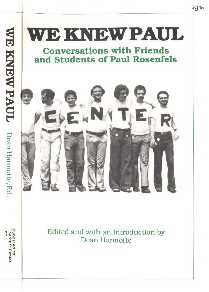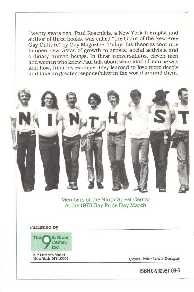|
|
The Ninth Street Center
Our Publications |

|
We Knew Paul: Conversations with Friends and Students of Paul Rosenfels [1990] edited and with an Introduction by Dean Hannotte |
Once the Center was going full steam I knew that an event of historical interest had occurred, that Paul had proven himself to be indeed not just a curiosity but a world class figure. I had by that time read scores of biographies of famous people and understood how much more real a figure like, say, Gandhi becomes when you see him in historical context, hopefully with a few warts thrown in. Gandhi, incidentally, drove his three sons to alcoholism and suicide.
When Paul was alive, though, it was all we could do just to keep up with the new insights that were coming out of him week after week. Technophiles who owned video-cameras never thought to record any of his talk groups. Even the Ninth Street Center Journal was put on the shelf from 1974 to 1983 because "creative writing" seemed so two-dimensional compared to the inner work of personal growth that we were finally learning to make work for us.
After his death in 1985, though, the Center entered a quieter phase. There seemed to be more time now for reflection, for recreation, for enjoying the simpler things. It seemed to me as good a time as any to debrief these people who had been so fortunate to witness Paul's life.

I didn't ask anybody to interview me for two reasons. First, these would be conversations, not just questions and answers. My words and ideas would already appear on every page of this book. Secondly, having lived with Paul for seven years and having been his best friend for the last nineteen years of his life, I felt that my story if told in full would amount to a book all by itself.
In his autobiography, Paul says that his relationship with me was "the greatest exposure I have known to my compulsive anger reactions." Similarly, I have spent far too much of my life obsessively hating his crimes against me. Even now I don't feel ready to be objective about him in anything like a book-length treatment. But that doesn't mean I don't know genius when I see it.
We Knew Paul, though neither an exhaustive analysis of his personality and relationships, nor a detailed chronicle of his growth and development, still offers glimpses of the man you would never glean from his own writings. It will never be as important as the canon itself, of course, but people have a right to be curious about humanity's benefactors. And I know that as time goes by their curiosity about Paul will only grow.
From my Introduction:
Paul Rosenfels is a man most people have never heard of, but his effect on those who came into contact with him was extraordinary. There are many unconventional psychotherapists around who attempt to liberate people by sanctioning their deviancy, but few who offer demonstrable techniques to remove internalized obstacles to growth. Fewer still concern themselves with the wider social implications of psychological growth, or who have a vision large enough to encompass the whole of civilization as we know it. Paul not only helped creative people break free of the intimidating and seductive pressure of social norms, he also developed a comprehensive theory of human nature which allowed seemingly unique aspects of one's personal history to be understood in terms that applied to everyone. . . .
|
| See the rest of the Introduction to this book |
|
| See the names of the people who were interviewed |
|
| See some interesting quotes from this book |
|
| See the full text of this book (574Kb) |
[E:\DH\NSC\HTP\WKP.HTP (37 lines) 1999-07-01 03:45 Dean Hannotte (DH)] | ||||||||